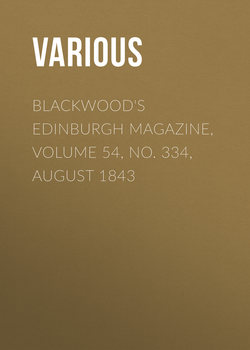Читать книгу Blackwood's Edinburgh Magazine, Volume 54, No. 334, August 1843 - Various - Страница 1
FORMS AND BALLADS OF SCHILLER. BY SIR EDWARD LYTTON BULWER
PART THE LAST
ОглавлениеWe here close our attempts to convey to the English reader some notion, however inadequate, of the genius and mind of Schiller. It is in these Poems, rather, perhaps, than in his Dramas and Prose works, that the upright earnestness of the mind, and the rich variety of the genius, are best displayed. Here, certainly, can best be seen that peculiar union of intellect and imagination which Mr Carlyle has so well distinguished as Schiller's characteristic attribute, and in which it would be difficult to name the modern poet by whom he is surpassed; and here the variety of the genius is least restrained and limited by the earnestness of the mind. For Schiller's variety is not that of Shakspeare, a creative and universal spirit, passing with the breath of life into characters the most diverse, and unidentified with the creations its invisible agency invokes. But it is the variety of one in whom the consciousness of his own existence is never laid aside; shown not so much in baring the minds and hearts of others, as in developing the progress and the struggles of his own, in the infinite gradations of joy and of sorrow, of exquisite feeling and solemn thought. Hence, in the drama, arise his faults and deficiencies; in his characters, he himself speaks. They are gigantic images of his own moods at different epochs of his life—impassioned with Moor—philosophizing with Posa—stately, tranquil, and sad, with Wallenstein. But as, in his dramas, this intense perception of self—this earnest, haunting consciousness—this feeling of genius as a burden, and of life as a religion—interferes with true dramatic versatility; so, on the contrary, these qualities give variety in his poems to the expositions of a mind always varying, always growing—always eager to think, and sensitive to feel. And his art loved to luxuriate in all that copious fertility of materials which the industry of a scholar submitted to the mastery of a poet; to turn to divine song whatever had charmed the study or aroused the thought: philosophy, history, the dogma, or the legend, all repose in the memory to bloom in the verse. The surface of knowledge apparent in his poems is immense; and this alone suffices to secure variety in thought. But the aspiring and ardent nature of his intellect made him love to attempt also constant experiments in the theme and in the style. The romantic ballad, the classical tale, the lyric, the didactic, the epigrammatic—the wealth of his music comprehended every note, the boldness of his temper adventured every hazard. Yet still, (as in our Byron, in our Goldsmith, and as, perhaps, in every mind tenacious of its impressions,) some favourite ideas take possession of him so forcibly, as to be frequently repeated as important truths. The sacred and majestic office of the poet—the beauty of ideal life, (in which the author of the "Robbers" and "William Tell" deemed, at last, that the only liberty was to be found)—the worship of Virtue and the Beautiful, for their own sake, and without hope of reward;—these, and many ideas minor to, and proceeding from them, revisit us in a thousand tones of eloquent and haunting music.
Reluctantly we tear ourselves from a task which has indeed been a labour of love. Many poets may inspire as high an admiration as Schiller; few so tender a personal affection. Even in his doubts and his errors, we have that interest in his struggles which arises from the conviction of his sound heart and his manly nature. Wrestling at one time with bitter poverty, at one with unhappy passion—lonely in his habits, prematurely broken in his health, his later wisdom dispelling his early dreams of Utopian liberty—still, throughout all, his bravery never fails him, his gentleness is never soured; his philanthropy changes its form, but it is never chilled. Even when he wanders into error, it is from his search for truth. That humanity which the French writers of the last century sought to preach, Schiller took from the scoffing wit of Voltaire, and the unhealthy enthusiasm of Rousseau, to invest it with the thoughtful sweetness and the robust vigour of his own great soul. And we believe that no one can depart from the attentive study of that divine bequest he has left the world, without a more serious respect for virtue, and a more genial affection for mankind.
E. Lytton Bulwer.
